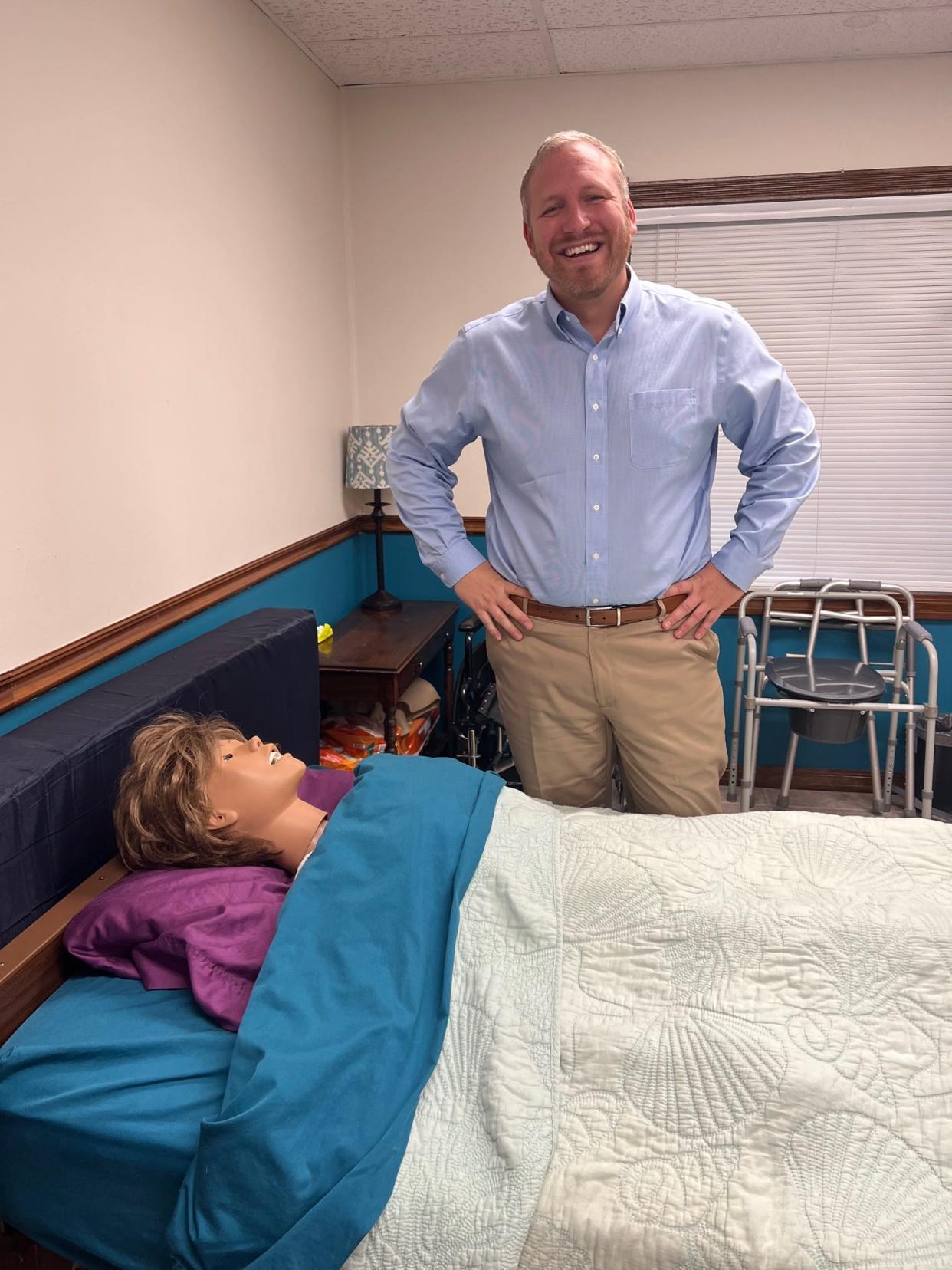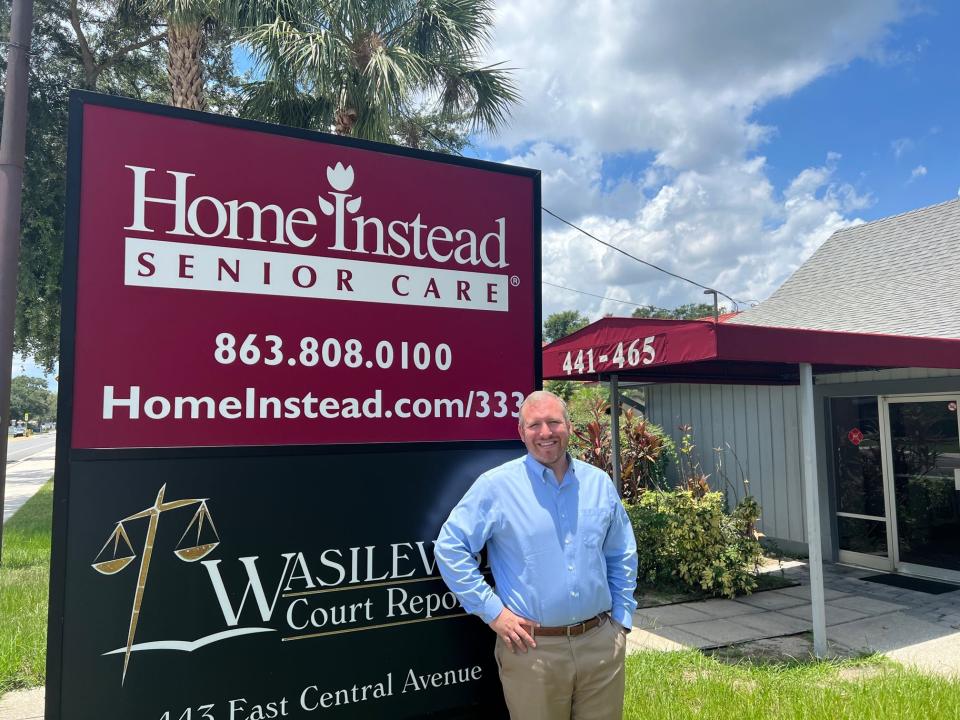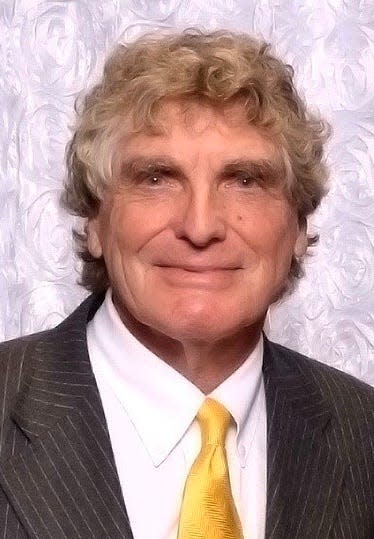'You have to care': Family experience led Mark Arquitt into the home-health care business

It is a sobering fact that the older we get the more statistically likely we are to require assistance in the ordinary tasks of daily living.
Meeting these needs are different entities from freelance caregivers to full-service nursing homes. In the middle are at-home caregiving businesses that cater to the desire of most people to remain in their own residences for as long as possible.
Mark Arquitt, 34, is owner of Home Instead, an at-home caregiving service operating in east Polk County. Florida born and Avon Park raised, Arquitt started as a general manager in the Winter Haven business in 2016 and purchased the franchise thereafter.
He got his start in caregiving when he took care of his own grandfather. He puts in about 60 hours a week, which he says is an improvement over the 80 hours he labored when he first became the franchise owner.
Q. What qualifications are necessary to work in your industry?
A. You have to care. I can teach you how to give a bath, but I can’t teach you how to give a damn. Your heart has to be in it. You can weed out the others pretty easily – they really can’t take it very long. Someone who cares looks for the details – checks on doctors’ appointments, looks in the fridge. Do you have fresh fruit? Do you have a meal for tomorrow when they’re not there? Those are the things that make a great caregiver. Every one of my staff has a personal experience taking care of a loved one. If it’s not a personal experience they don’t stay here.
Q. What sort of misconceptions do people have who come to you for help?
A. Underestimating how much help is really needed. Sometimes they come with the perception that, “Oh, I just need a little housekeeping” but they haven’t bathed in two or three weeks because they can’t get in and out of the shower. Or they think they’re making it on their own but they’re failing to get to a doctor appointment because they forget. Or they don’t realize the stress a family caregiver is under when taking care of an Alzheimer’s patient.
There are a little over 5 million Alzheimer's patients in America – those that are diagnosed. The sheer number of people who don’t have the diagnosis is astronomical. I often worry that the family caregiver is going to die before the client. We take care of a lot of families where the caregivers have worked themselves into a hole.
A July 4th remembrance A grand experiment based on 'consensus and compromise'
Q. How does your service help take care of caretakers who are family members?
A. We try to move things off their plate. They don’t have to be the only one to do everything. Someone with dementia may be wandering all night. You need sleep – you can’t be up 24/7. Or you’re pushing off your own doctor appointment because you have to take them to theirs. Our caregivers can take them. You don’t have to be the only one to clean the house. We try to let them go back to being the spouse or the daughter. They’ve been the caregiver for so long they’re worn out and want to be a family member again.
It killed my own grandfather. At 80 he was cutting down trees. At 84 he was on a walker because he had a nasty fall trying to stop my grandmother from falling. It happens to a lot of seniors – they’re trying to help their spouse get around and their strength is not much better and they end up falling.
Q. What’s the range of services a company like yours provides?
A. It’s about the same as assisted living. We do bathing, grooming, dressing, cleaning, emptying the catheter bag, cooking, getting groceries. We help with transfers – out of bed to a walker. About 400 people a year die falling out of bed. About 80% of what we do is personal care, but we take care of everything else you can no longer do. Sometimes it’s as simple as helping you sort your mail, or making sure the spam callers don’t get through to you. We answer the phone so that anyone looking for money has to go through the family or CPA. But the majority of what we do is what takes place in assisted living, except you get to stay home.
Q. What kind of training is required?
A. We hire CNAs and HHAs. Certified Nursing Assistant is a step down from a nurse in a hospital. They’re handling a lot of the physical care – bathing, dressing, grooming. The other is a Home Health Aide – they’re trained solely for the house, not for a nursing home or hospital. We test everyone who comes in here – doesn’t matter if you have a license. I want to see if you have the skills.

Q. And background checks?
A. We run background checks annually as well as driving records. We do two background checks – one through the state but also a different one through our corporate headquarters. And we do drug testing upon initial hire and at random. I can’t tell you how many people in Polk County come up “hot” for something. There’s always an excuse – “I was in a car with somebody” or “My partner does it but I don’t.” We just don’t tolerate it. You don’t want someone driving you who’s high.
Q. Is taking care of dementia patients a big part of what you do?
A. A very big part. The busiest time for us is Thanksgiving to May. The family will talk to mom or dad on the phone and they can fake it for a little while. “We’re fine, we’re okay. Your mom’s wandering a little bit.” Or, “She’s just a little confused.” Then the family comes down for the holidays and it’s, “Oh, wow, we need a little help.” It could be an untreated UTI – a urinary tract infection is devastating to seniors. It exacerbates dementia and can affect people dramatically – they’ll wander down the road, forget your name, get very combative. Routine is very important. We wear the same color shirt every day so someone with dementia is not confused by why someone wearing a different color shirt is there.
Q. How do you deal with cultural and language differences between clients and caregivers?
A. The biggest factor is personality. Everyone can give a bath. But feeling like you have a friend coming to help you – that’s what makes people comfortable. We’ve had some clients for 10 years and their caregivers become like daughters. Instead of “Oh, I have help coming on Tuesday” it’s “I’ve got Mary coming Tuesday.”
Q. This industry has a reputation for high employee turnover. Why?
A. It’s a hard job that doesn’t pay very well. It’s physically taxing. It’s emotionally very taxing. A lot of times we lose caregivers when their client dies. They got very attached to that person and they just don’t want to go into another home and face death again.
'My childhood friends' Winter Haven grads, Army officers died in Vietnam17 months apart
Q. What is the range of choices in caregiving?
A. There are really three types of at-home care.
First there’s the “gray market” – a friend from church, a neighbor, who will sit with your loved one. The great thing about that is that it’s someone you know. The hiccup is who’s covering their liability insurance, workers comp, taxes – as well as are they bonded? If they get sick, is there anyone to replace them?
The next one is the “registry” – a 1099 organization. They are contractors so you still have to worry about their taxes since they work for you. Do they have their own workers comp insurance? Because if a caregiver falls it’s on the client.
Then there’s the agency – that’s us – they are more expensive but they cover all the liability, the taxes, the payroll, and there’s a lot more supervision. There’s a cost involved with that, but you’re also protecting your home.
Q. What would be the cost for professional full-time, 24/7 at-home care?
A. A quarter million a year. If you have a long-term care policy, hang onto it. It covers part of it. Wages have gone through the roof and our rates have had to go up to cover it.
Q. What advice can you offer for families thinking ahead?
A. Get a plan. There are roughly 70 million baby boomers retiring in the next seven years, and they all seem to be moving to Florida. About 26% of Polk County’s residents fall into the category of seniors – 55 and above. That’s only going to grow in the coming years, and every one is going to need help one day. Tour assisted-living and at-home health care companies. That way you’ll know who you want to deal with. When an emergency happens you’re going to be overwhelmed and there are waiting lists at a lot of facilities. Most of all, you need people who care.

Q. What personal experience led you to this field?
A. My grandmother in Tennessee had a stroke, and dementia afterward. She became very mean, very confrontational, combative. My grandfather took care of her for seven hard years. It wore him out. We didn’t know how bad it was until we started helping. They had four kids who lived nearby and they all helped. I was in college nearby getting my MBA and also started helping. When she passed away, that morning he said to me, “I’ve been crying nonstop. Will you come live with me?” What do you say after that? I lived in the basement and he called me his personal servant. He was a bit of a mean codger, but I got the full personal care experience from that – helping with everything. I realized this is what I love to do.
This article originally appeared on The Ledger: Mark Arquitt runs Home Instead, home health care provider

